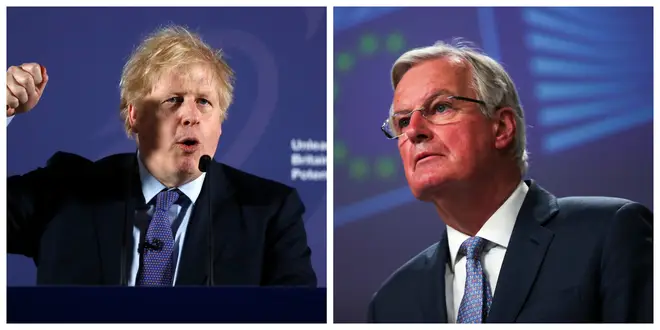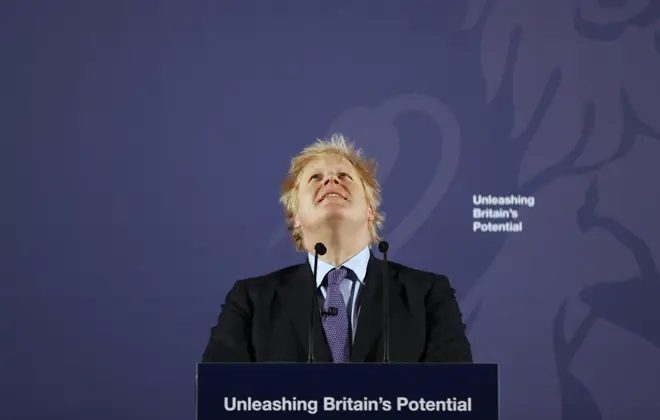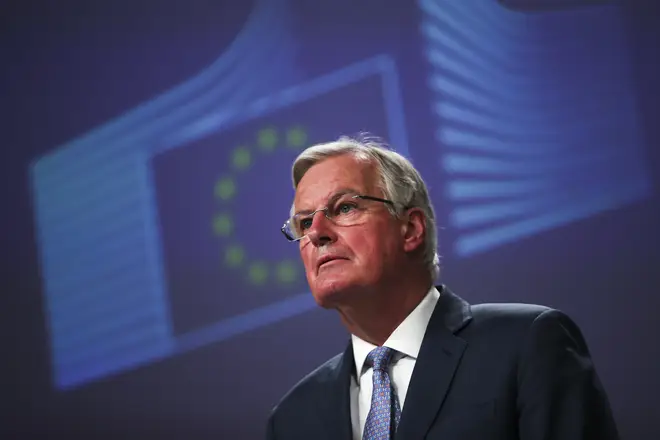
Clive Bull 1am - 4am
3 February 2020, 11:42
Boris Johnson and Michel Barnier have both set out their post-Brexit vision for the UK's trade agreement with Europe in speeches today.
The Prime Minister said Britain has settled a question of "sovereign authority" and can now go out into the world with "newly recaptured powers".
Speaking in Greenwich, Mr Johnson said: "We have settled a long-running question of sovereign authority, we have ended a debate that has run for three and a half years - some would say 47 years...
"We have the opportunity, we have the newly recaptured powers, we know where we want to go, and that is out into the world."
Mr Johnson said that at a time when tariffs were being "waved around like cudgels", the UK was ready to step forward as a champion of free trade.
"Humanity needs some government somewhere that is willing at least to make the case powerfully for freedom of exchange," he said.
"Some country ready to take off its Clark Kent spectacles and leap into the phone booth and emerge with its cloak flowing as the supercharged champion of the right of populations of the earth to buy and sell freely among each other.
"I can tell you in all humility the UK is ready for that role."

The Prime Minister also confirmed that the UK would seek a Canada-style free trade agreement with the EU.
"We want a comprehensive free trade agreement similar to Canada's, but in the unlikely event that we do not succeed then our trade will have to be based on our existing Withdrawal Agreement with the EU," the PM said.
"And let's be clear, the choice is not emphatically deal or no deal - we have a deal, we've done it, and it did indeed turn out as I correctly prophesied to be oven ready.
"The question is whether we agree a trading relationship with the EU comparable to Canada's or more like Australia's and I have no doubt that in either case the UK will prosper mightily."
Mr Johnson said: "There is no need for a free trade agreement to involve accepting EU rules on competition policies, subsidies, social protection, the environment or anything similar, any more than the EU should be obliged to accept UK rules.
"The UK will maintain the highest standards in these areas - better in many respects than those of the EU - without the compulsion of a treaty."

He also stated that the UK would be seeking a "pragmatic" agreement with the EU on security as well as an agreement on aviation to allow cheap flights to continue, and that the Government was also ready to consider an agreement with Brussels on fisheries.
"It must reflect the fact that the UK will be an independent coastal state from the end of this year, controlling our own waters," he said.
"Under such an agreement there would be annual negotiations with the EU, using the latest scientific data, ensuring British fishing grounds are first and foremost for British boats."
LBC's political reporter Theo Usherwood explained that the UK will be carrying out multiple trade deals at the same time, a move which Boris Johnson called a “great multi-dimensional game of chess”.
He also pointed out that Boris Johnson says the UK will also not accept “any diminution” in food hygiene standards and "will not engage in some cut throat race to the bottom".
The comments come after US secretary of state Mike Pompeo told LBC last week that food safety mustn’t be used as a “ruse” to block US food companies from UK.
Boris Johnson says the UK will also not accept “any diminution” in food hygiene standards.
— Theo Usherwood (@theousherwood) February 3, 2020
“We will not engage in some cut throat race to the bottom.”
*reminder Mike Pompeo told @IainDale last week food safety mustn’t be used as a “ruse” to block US food companies from UK.
He says the UK is ready for the “great multi-dimensional game of chess” that will see the UK carry out multiple trade deals at the same time.
— Theo Usherwood (@theousherwood) February 3, 2020
The PM then name checks the International Trade Secretary Liz Truss.
Earlier in the day, the European Union's chief negotiator on Brexit, Michel Barnier, set out the bloc's goals for a trade deal.
Mr Barnier presented the draft negotiating directives for the future relationship negotiations.
He also said the EU would be "clear headed" in its negotiations with the UK.
Brussels' chief negotiator said: "Our aim is to conclude an ambitious partnership with the United Kingdom.
"But we will remain clear headed. The most ambitious partnership is the one that we had, because we were in the same union."
He added: "When you are not a member of the European Union then, objectively speaking, your position is different and less favourable."
The European Commission published its draft negotiating mandate for a single package which will consist of three components, general arrangements, economic arrangements and security arrangements.
Speaking about the three conditions he said: "The UK should commit itself to applying the European Convention on Human Rights.
"Secondly, the British government should set up adequate standards for data protection - this is an essential concern for the Europeans and this is something that the European Parliament is paying a great deal of attention to.
"Thirdly, any co-operation should be subject to an effective dispute settlement mechanism.
"Where a partnership is based on concepts derived from European law, obviously the European Court of Justice should be able to continue its role in full."

European Commission president Ursula von der Leyen said: "It's now time to get down to work. Time is short.
"We will negotiate in a fair and transparent manner, but we will defend EU interests, and the interests of our citizens, right until the end."
Mr Barnier also said the EU was prepared to make a "exceptional offer" for a wide-ranging free trade agreement with the UK.
However, he commented that it was conditional on competition remaining "open and fair" with "specific and effective guarantees" to ensure a "level playing field" over the long term.
"That means mechanisms to uphold the high standards we have on social, environmental, climate, tax and state aid matters," he said.
He said there must also be an agreement on fisheries with continued reciprocal access to markets and waters with "stable quota shares".
Mr Barnier warned that even if they were able to agree a "best-in-class" trade deal it would still not be "business as usual".
He said rules of origin and customs formalities would apply between the UK and the EU and access to EU markets would be subject to "certification and market authorisation and supervision activities".
There would be no harmonisation or mutual recognition of rules, and UK financial services providers would no longer enjoy EU "passporting rights".
Goods entering the EU from the UK would be subject to regulatory checks," he said.
"These are the automatic and mechanical consequences of the UK's choices and businesses must adapt now to this new reality," he said.
Mr Barnier said the more the UK was prepared to maintain common standards with the EU, the higher quality access it would get to EU markets.
"This will be up to the UK to decide. Will it continue to adhere to Europe's societal and regulatory model in the future or will it seek to diverge?" he said.
"The UK's answer to this question will be fundamental to the level of our ambition of our future relationship. The UK must know this."